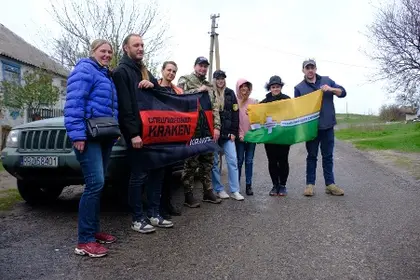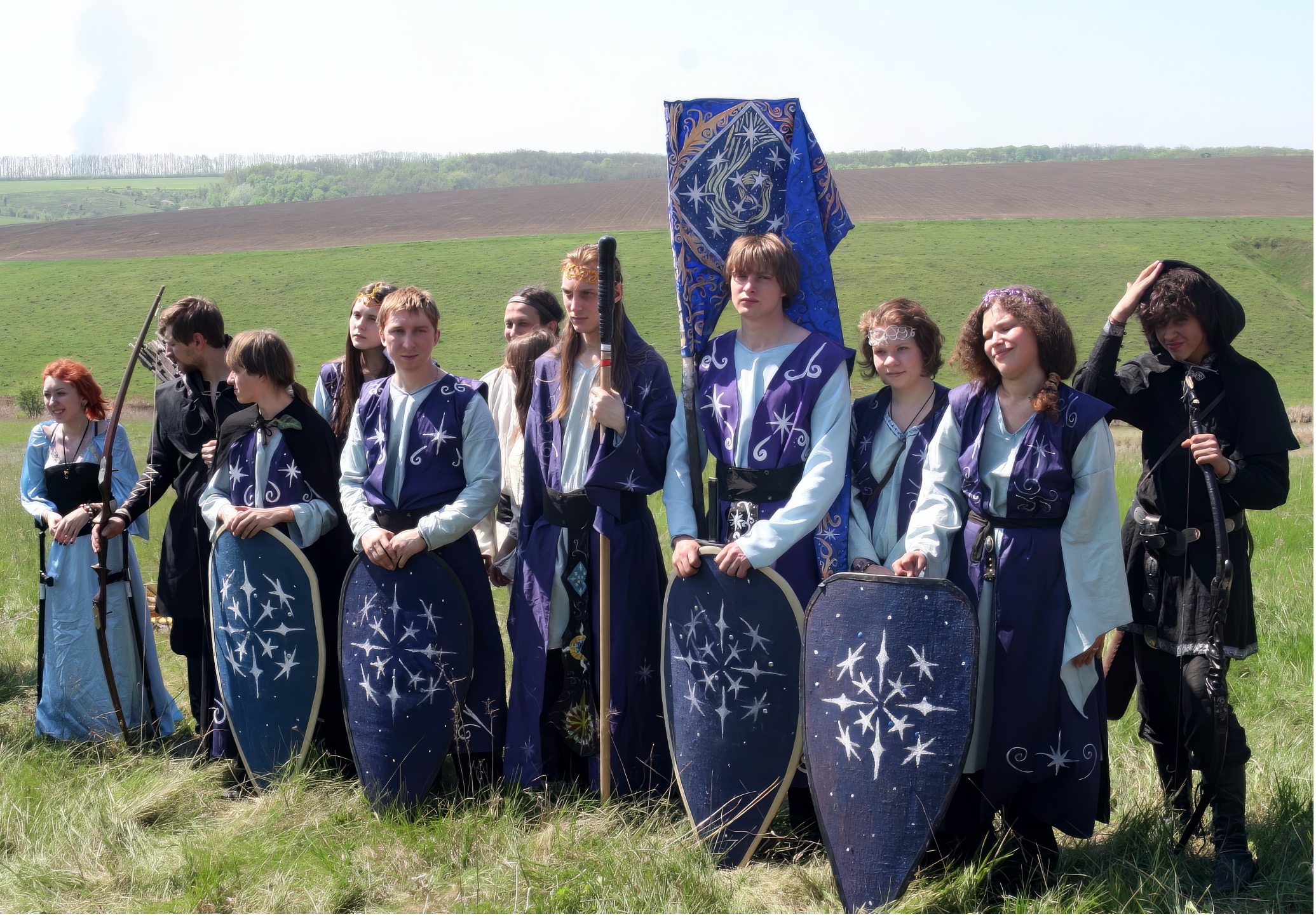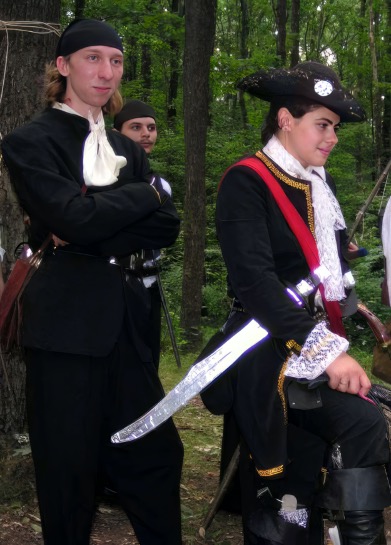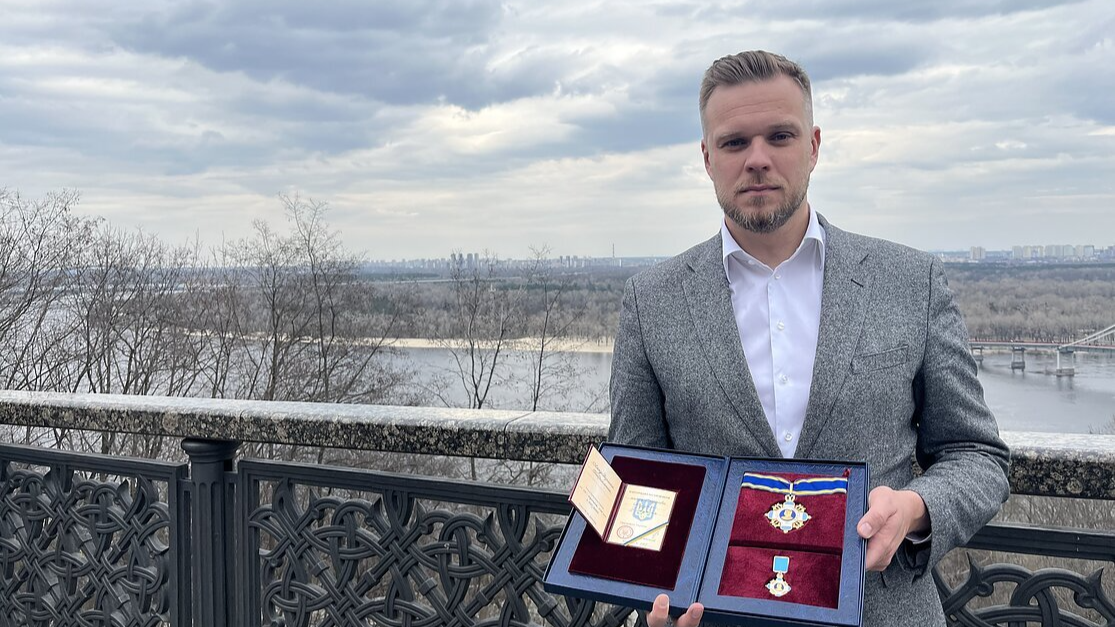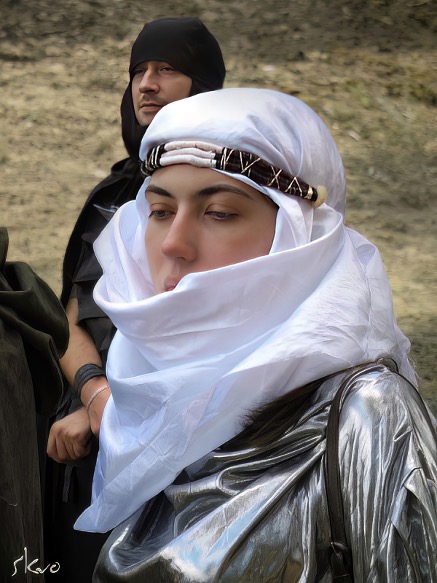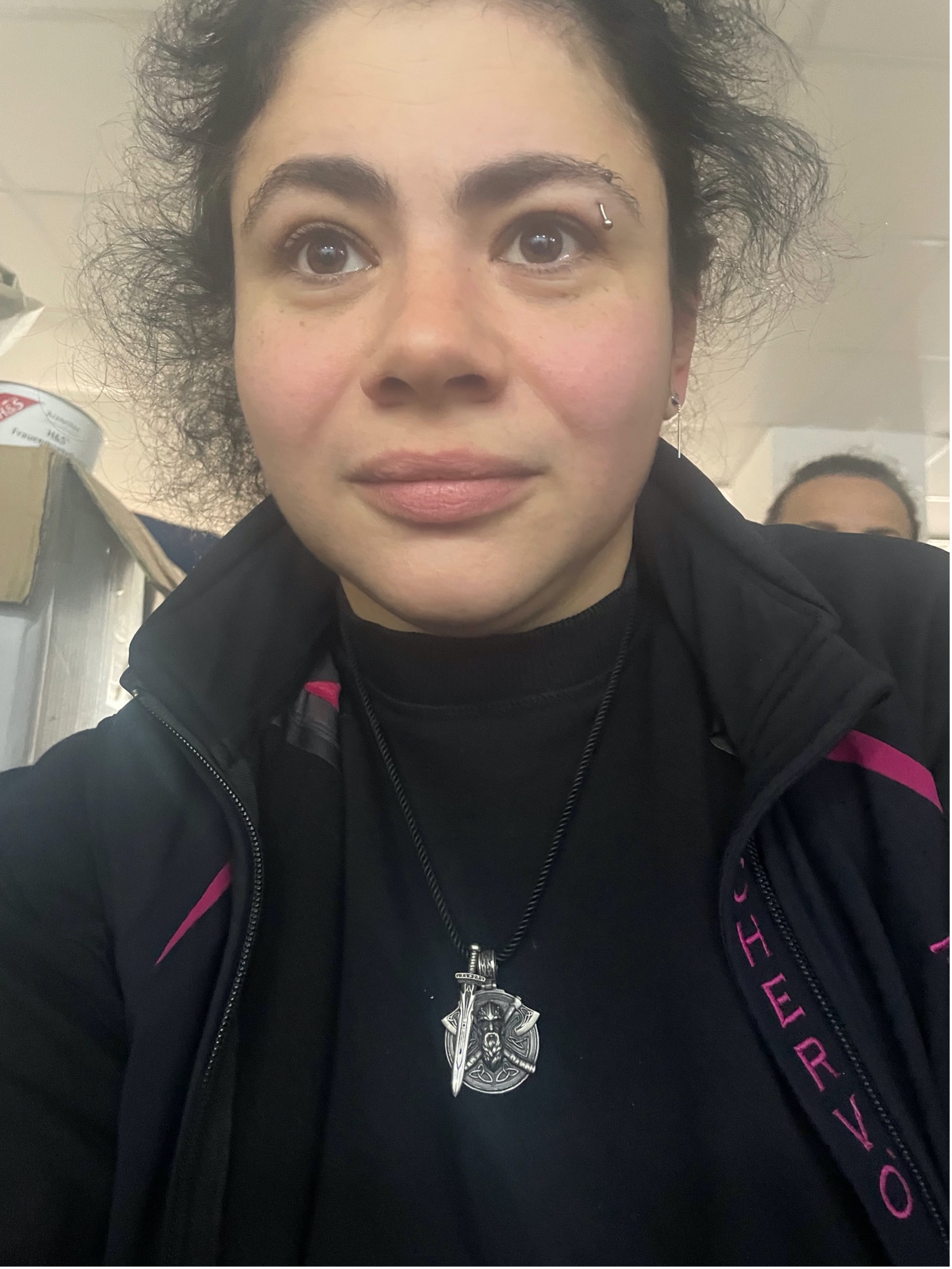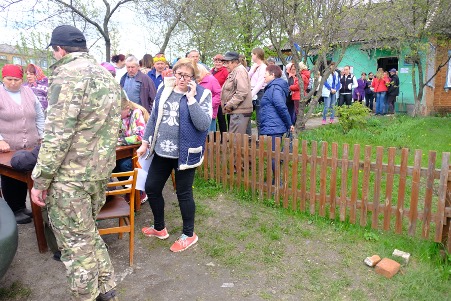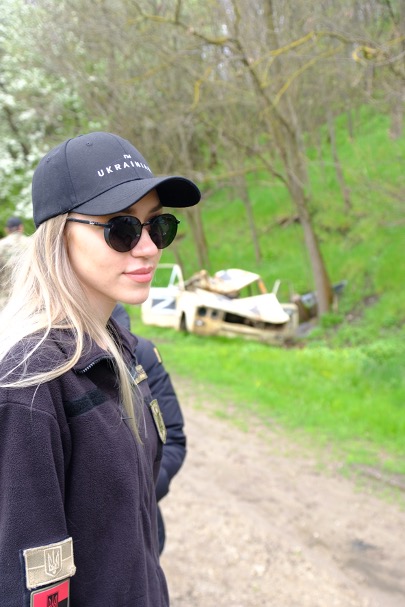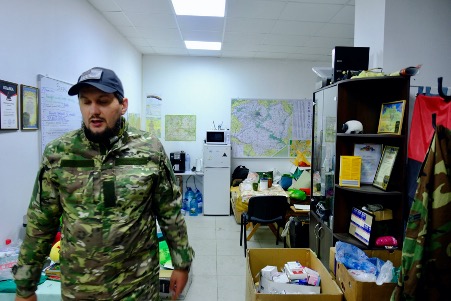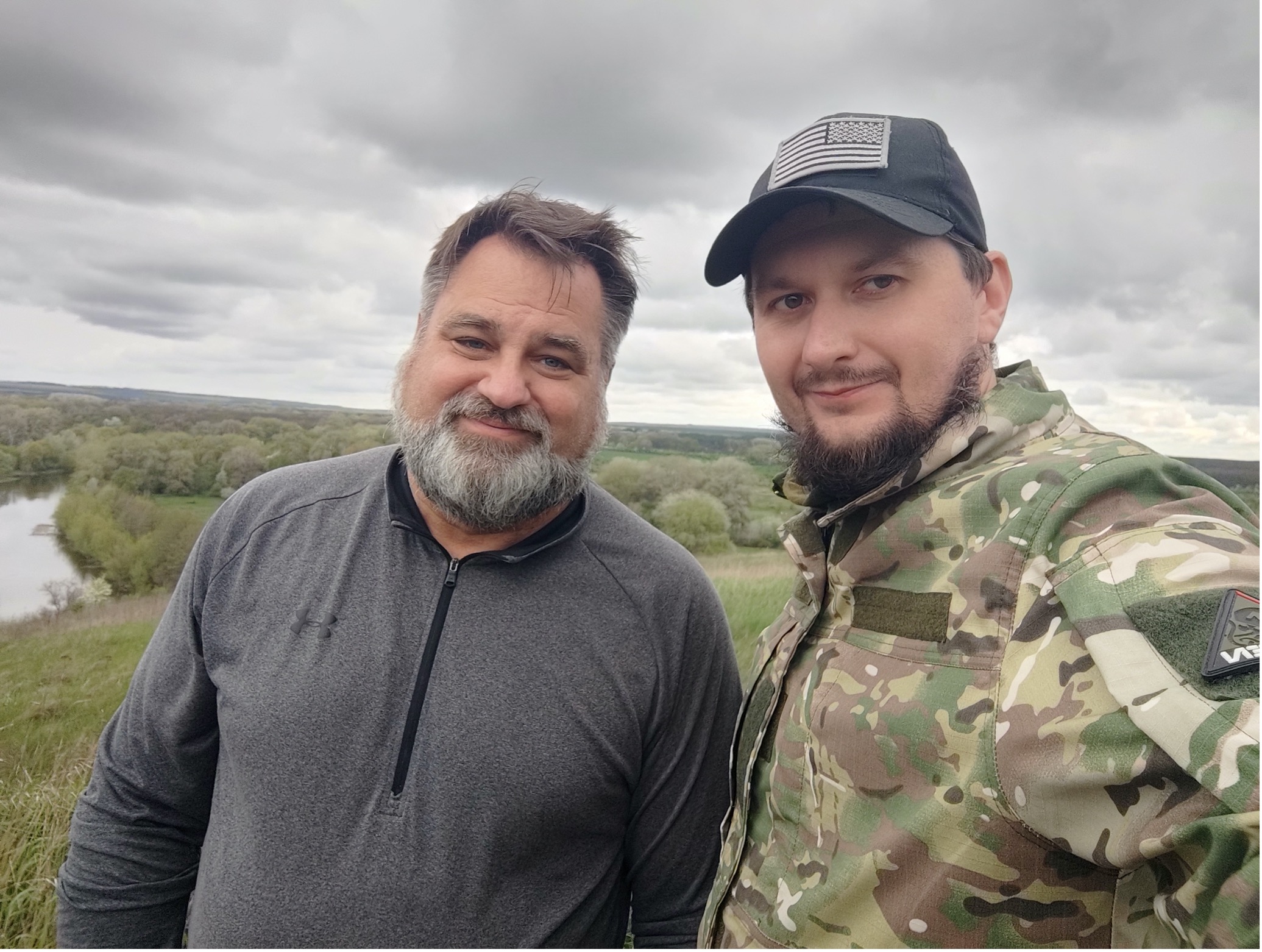Anika Kalashnikova opens her phone and shows Kyiv Post numerous photos of herself, her sister, Masha, their friend, Mikha, and others dressed in elaborate costumes and wearing stylized make-up. Among the strange cast are medieval royalty, Dune inhabitants, ghosts and goblins, pirates and many more characters from history and books.
Before the war, Anika, 40, along with her family and friends, found joy through live action role play (LARP). The practice involves fighting fictional battles in carefully-constructed handmade costumes and using handmade swords and shields in special locations like old castles.
JOIN US ON TELEGRAM
Follow our coverage of the war on the @Kyivpost_official.
Following Russia’s invasion, Anika, Masha, Mikha and others from their LARP team, started volunteering in response to a very different kind of battle – delivering food supplies to five villages in rural Kharkiv region with the Kharkiv Humanitarian Centre.
The boisterous and bright young people from the Center are very much like the band of pirates they are used to enacting, but pirates for good rather than their own bounty. They share an intense sense of purpose for helping their fellow Ukrainians and the country’s struggle, bursting with buoyant camaraderie and good humor.
As her colleagues munch on supermarket take-away and pack Harry Potter-branded plastic shopping bags with products, Maria Kalashnikova (Masha for short), 37, speaks to Kyiv Post.
“Anika and I are Jews. We partly went to school in Israel and we experienced the Intifada,” Masha recalls.
“In war, you seek some sense of control and you try to influence your own fate. And it’s our way of trying to end the war more quickly. It’s our city and our country, and I want my daughter [a 12-year-old temporarily in western Ukraine] to come back to a peaceful one,” she says.
“My daughter is constantly asking me when she can come with me and her Aunt Anika to do the role play. Why shouldn’t that be possible for her?”
Earlier that day, in a beaten-up van pock-marked by shrapnel, Masha and Anika, Mikha and the Center’s other volunteers hurtled along the broken roads, wound around blown-up bridges, and drove past thousands of ruined houses and minefield warning signs to do their humanitarian work.
The Center delivers food, hygiene products, batteries, medical supplies, clothing and much more to communities that were impacted by seven months of Russian occupation in 2022. Their supplies come in from some 26 countries to a ramshackle but buzzing warehouse space where teams bundle and box material for distribution.
In every village the Center visits, locals – wrapped in puffy winter clothes – come out to accept the assistance and say thank you. Many have lost much of their income after the loss of up to two harvests, as well as thousands of hectares of fields to mines and ordnance.
Mikha, 34, with a long pony tail and ear rings, cuts a figure not unlike Johnny Depp’s swashbuckling character, Jack Sparrow. He yells at "Max", a soldier from the “Kraken” military unit, from the jammed back seat of their olive-drab painted van.
“What are we giving out at the next village?”
“You!,” he yells back. “They need some young guys in this village.”
Andri coordinates Kraken’s humanitarian work with the Center’s.
In another vehicle, a US-branded SUV, also in olive drab, the driver is Ryan Meyer, 39, from Oklahoma.
Ryan, a former oilfield worker, has been coming to Ukraine for months at a time since the start of Russia’s full-scale invasion. He speaks virtually no Ukrainian or Russian but makes everyone laugh with his American enthusiasm and YouTube clips he shows on his phone where there’s coverage.
“I’m here because the Russians [previously] did this to my family. They shouldn’t be able to do it to other Ukrainians now,” Ryan says.
His ancestors were German Mennonite farmers in eastern Ukraine in the 18th century who were repressed and forced to leave by Empress Katherine.
“The way I explain the situation to my friends in Oklahoma is [that it’s like] tornadoes,” Ryan explains. “I say to them, ‘think of the worst tornado you can remember and how it just cut through a town and left nothing behind it.’ Well, that’s what the Russians are trying to do here.
“You can’t stop a tornado, but we can stop the Russians,” Ryan exclaims fervently.
At Lysohirka, a tiny village made up of a dozen houses, mostly elderly farmers and a friendly herd of goats, there is a destroyed car emblazoned with “Z” symbols left behind by the Russian occupiers. They came mostly from the so-called Luhansk People’s Republic or from outer Russia, such as Buryatia.
A villager explains that Ukrainian troops ran over the car twice with their tank – forwards and backwards – “to be sure it was dead!”.
Ryan and others pose for selfies by the rusting metal heap. He urinates on it with a cigarette hanging out of his mouth. Another pirate doing his thing.
The others laugh, including Lera, 20, a translator originally from western Ukraine.
Valeria “Lera” Stepanenko wears a military-style jacket with “O’Donnell” over its breast plate and a black baseball cap that reads “I’m Ukrainian.” The jacket once belonged to her once-boyfriend, Sage “Don” O’Donnell, a 24-year-old Australian soldier who died in combat in Luhansk in December. She regularly volunteers with the Center too.
“Don contributed to victory his way through the ultimate sacrifice. I contribute to it my own way too, including to honor him,” Lera tells Kyiv Post.
On the way back to Kharkiv, there is a stop at another town – Kuny’e – and another delivery of boxes of pasta from a foodbank. A village worker explains how much work there is to be done to clear the local farming fields and how they are not waiting for the government to take action officially.
Mikha walks Kyiv Post to the little town square and park which has been restored and planted with tulips for spring. It is, perhaps, to show Ukrainians doing beautiful things amidst the brutality of the war on them.
Later, back at the warehouse, Anika and Anya, a bookkeeper for a school by night and the Center’s “Fast and Furious” driver by day, talk about new government rules to account for all donations. They know the Center must and will comply, and they have worked out how to do so, but it’s not natural for the merry band of pirates who just want to get their mission done.
It’s now around 10:00 p.m. The team has been going since 8:00 a.m. Masha looks on at the activity in the warehouse. Mikha, Ulyana, Lera, Ryan, and Ann, a Polish volunteer – are packing parcels. Anika and Anya are figuring out the books. Kraken’s Max – sucking on his ever-present apple-flavored vape – is examining a map for the next day’s run.
Masha reflects on the situation.
“I still look at Facebook. It’s now 30 people that I know who have died during the full-scale war. It’s horrible that our greatest generation is being killed off,” Masha says.
Maybe. But, also maybe, among the pirates and parcels, patriotism and purpose, they were right there in that warehouse too.
You can also highlight the text and press Ctrl + Enter


